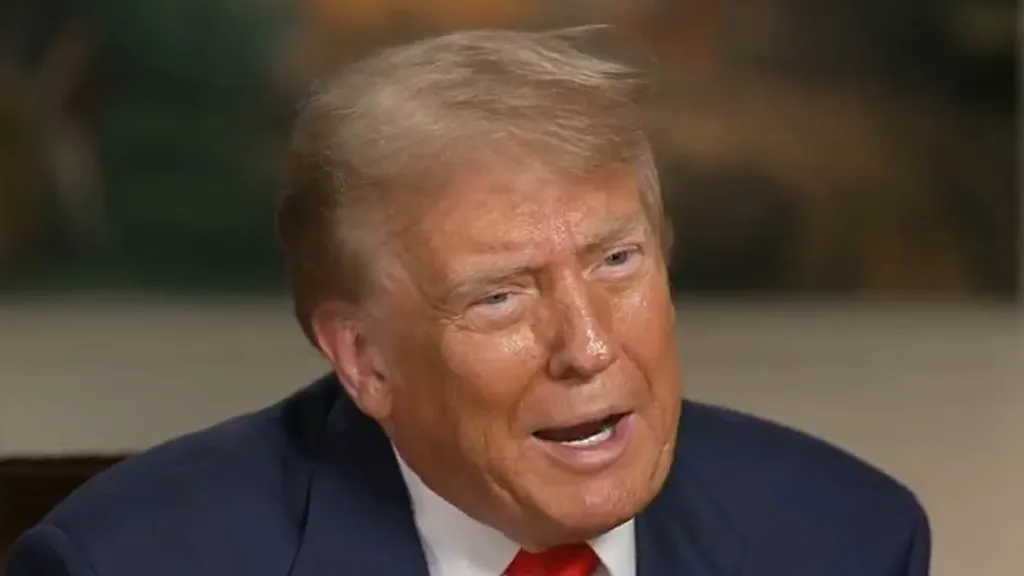Donald Trump has defended his aggressive trade tariffs, saying America would be in 'terrible shape' and 'like this innocent lamb being led to slaughter' without them.
The president left Fox News reporter Maria Bartiromo looking shocked as he went on to say, 'it's the way the world works, it's a nasty world' during his Sunday morning interview with the network.
'We're doing well on the tariff litigation,' Trump said, referring to an ongoing court battle over his Liberation Day tariffs on imports from most US trading partners.
'If some judge said we can't do tariffs, we would fall prey to the rest of the world who would do tariffs and are doing tariffs on us.
'If we couldn't fight them back with tariffs, this country would be in terrible shape. We would be like this innocent lamb being led to slaughter.
'So we're doing great on economics, we're doing great on tariffs. Tariffs is just a part of it.'
It comes as top economist Torsten Sløk recently admitted that he thinks Trump, 79, 'outsmarted all of us' with his economic policies - though experts said this statement should be taken with a grain of salt.
Earlier this year, Sløk, who is the chief economist at Apollo Global Management, warned that Trump's tariffs would be 'painful' and economically destabilizing.
But this week, he changed his tune by reframing the President's policy as a clever long-game - one which invites global negotiation while increasing federal revenue.
In the note, Sløk outlined a potential scenario: the White House could maintain its current tariff rates - 10 percent on most imports, 30 percent on Chinese goods - and give trade partners a year to negotiate with the White House.
Extending the current 90-day pause on new tariffs, he argued, would give American companies time to plan ahead and could help stabilize markets.
'This would seem like a victory for the world and yet would produce $400 billion of annual revenue for US taxpayers,' he added.
The timing is key. Trump's 90-day pause on new tariffs, announced in April, is set to expire on July 9.
Without an extension, the tariffs would immediately increase, with billions of dollars worth of products suddenly incurring more taxes.
But if the President extends the pause but keeps tariffs where they are, Sløk says the policy could offer clarity for companies and leverage in negotiations.
Trump's Liberation Day tariffs placed a levy on imports from most US trading partners, along with a separate set of tariffs on Canada, China and Mexico.
It marked his most sweeping tariff to date amid the trade war he launched during the first months of his return to the White House in 2025.
An appeals court has allowed the tariffs to remain in place for now, while judges review a lower-court decision blocking them on the grounds that he exceeded his authority by imposing them.
The Federal Circuit is set to rule on whether the tariffs are permissible under an emergency economic powers act that Trump cited to justify them by July 31.
The tariffs, used by Trump as negotiating leverage with US trading partners, and their sporadic nature, have shocked markets and whipsawed companies of all sizes as they seek to manage supply chains, production, staffing and prices.
Independent analysts told DailyMail.com that tariffs will likely raise prices on American families, including common consumer goods like groceries.
The ruling has no impact on other tariffs levied under more traditional legal authority, such as duties on steel and aluminum imports.
A three-judge panel of the US Court of International Trade ruled on May 28 that the US Constitution gave Congress, not the president, the power to levy taxes and tariffs.
They said the president had exceeded his authority by invoking the International Emergency Economic Powers Act, a law intended to address 'unusual and extraordinary' threats during national emergencies.
The Trump administration quickly appealed the ruling, and the Federal Circuit in Washington put the lower court decision the next day while it considered whether to impose a longer-term pause.
